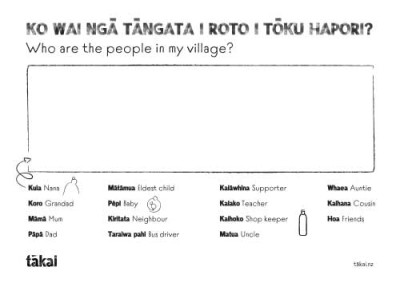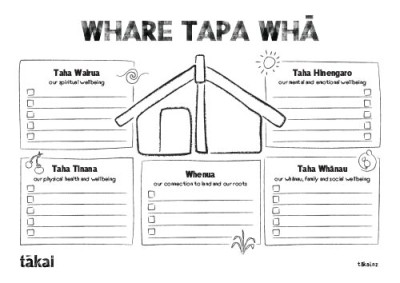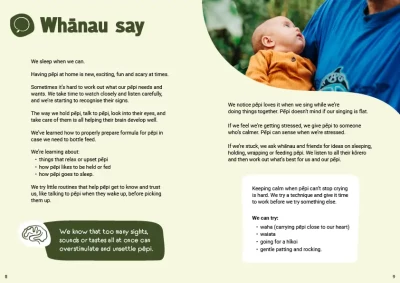
What parents might need
A guide to supporting new parents, factors that support or discourage new parents’ resilience, and your role as a whānau supporter.
Asking for help
If we’re stuck, we ask whānau and friends for ideas on sleeping, holding, wrapping or feeding pēpi. We listen to all their kōrero and then work out what’s best for us and our pēpi.
( Whakatipu Te Pihinga booklet 1, page 9)
Parents are more likely to seek information about parenting from friends and family members that they trust than from anyone else. And when they share newly received parenting information with friends and family, they’re more likely to make behaviour changes.
So, talking with friends and whānau about baby and parenting has advantages for new parents – both for getting help, and for helping to understand learning and make changes.
Getting support
Having pēpi at home is new, exciting, fun and scary at times.
(Whakatipu Te Pihinga booklet 1, page 8)
Emotional and practical support from whānau and friends can also reduce stress.
A supportive partner is one of the most helpful factors for a new parent. And it’s important that both parents are looking after themselves and each other – a depressed dad can have negative effects on mum and baby.
Factors that increase parents’ resilience
- Confidence in their role as parents
- Good physical health
- Positive wellbeing and mental health
- Supportive relationships
The best way for whānau to help
Additional help and support from friends, whānau and community networks can also make the entry to parenthood so much easier.
The best way to help is by doing practical tasks like washing and cooking, rather than taking the baby away to give parents a chance to catch up with the chores.
Factors that reduce parents’ resilience
- Alcohol or substance misuse
- Health problems
- Illness
- Low confidence
- Relationship conflict
- Stress
Risk factors for baby and their family
- Lack of someone to confide in
- Lack of support
- Not seeking support from outside
- Social isolation
Listening and supporting
Having someone who will listen to parents and help them explore their concerns is valuable for them, and for baby.
Parents need a supporter who can help them identify potential risk and resilience factors, encourage healthy coping strategies, and make referrals to specialist services if necessary.
Factors that increase new parents’ resilience
- Feeling OK about life
- Getting practical support
- Getting support from family and friends
- Having emotional support
- Having positive ideas about baby
- Having realistic expectations
- Looking after their physical health
- Receiving nurture and protection
- Relationship support
- Stability
Factors that reduce new parents’ resilience
- A negative atmosphere
- Feeling uncared for
- Lack of resources
- Lack of someone to talk to
- Lack of practical support
- Lack of support (being isolated)
- Relationship difficulties
- Unhealthy diet and habits
- Unrealistic or negative expectations
- Unrealistic or negative ideas about baby
The job of the whānau supporter
- Encourage bonding and attachment with baby
- Explore parents’ views and knowledge about parenting and the new baby
- Encourage realistic expectations for early development and parenting
- Share and explore accurate and helpful information regarding early infant growth
- Encourage effective coping strategies
- Identify risk and resilience factors
- Identify reliable support
- Consider and contact local support networks
‘Good enough’ parenting is ordinary magic
‘Good enough’ parenting is ordinary magic. The day-to-day things that parents do in a family are the things that make a positive difference. The phrase ‘good enough parenting’ tells us that simple, everyday activities make the most positive difference in a child’s development.
 pdf 3.3 MB
pdf 3.3 MB













